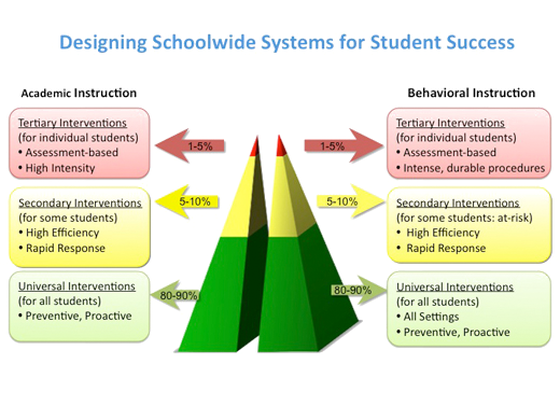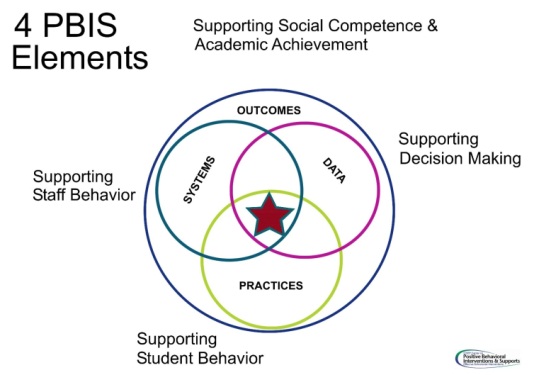Positive Behavioral Interventions and Supports (PBIS)
Positive Behavioral Interventions and Supports (PBIS) is a guide for creating safer and more effective schools by building a better environment through positive disciplinary practices. Schools elect to participate in PBIS and staff buy-in is essential to successful implementation.
PBIS Three-Tiered Framework

Rather than a prescribed program or curriculum, PBIS is a team-based process for problem solving, planning, and evaluation that includes the following essential elements:
- Three to five positively stated school-wide behavior expectations
- Procedures for systematically teaching, modeling, and reteaching those expectations to students and staff
- Procedures for recognizing students when they demonstrate established expectations
- Procedures for intervening when students do not demonstrate appropriate behavior
Each school customizes the practices and procedures for their school based upon the collection and analysis of school-specific data. School-based teams are trained to use their school discipline data to design, implement, and evaluate effective school-wide, classroom, non-classroom, and individual student discipline procedures.

A visitor to any school implementing PBIS should notice posters of positive behavior expectations throughout the building, positive communication between staff members and students, and students being recognized for exhibiting behavior expectations.
How Schools Are Trained to Implement PBIS
Interested school administrators attend an information session or meeting with the PBIS Specialist in the spring prior to beginning implementation and share the information with their staff members. Administrators seek the support of 80 percent of staff before moving forward with PBIS implementation.
School teams are identified and attend a summer training institute, led by the PBIS Specialist, on the essential elements and implementation of school-wide PBIS. School teams are provided with a framework to design, implement, and evaluate their positive school-wide behavior plan. Using the framework, the school teams develop an action plan to implement the essential elements of PBIS. Each school team designs their action plan to best meet their needs, support their school culture, and align with their school improvement plan. In addition to developing the action plan, the school teams provide staff training and support throughout the school year. PBIS teams meet monthly (at a minimum) to analyze data, review student and staff feedback on PBIS implementation, and evaluate their action plan.
In addition to training, each school has a PBIS behavior support coach to facilitate implementation. The coach is knowledgeable in behavior support and helps facilitate the efficient implementation of PBIS in the school.
Beyond School-wide Implementation
Once school-wide PBIS is thoroughly established, the focus of professional development becomes building the capacity of staff to implement Tier II and Tier III interventions. Tier II interventions focus on reducing the number of existing cases of problem behaviors (manifested by approximately 5 to 15 percent of students) by establishing efficient and rapid responses to problem behavior. Tier III interventions focus on an estimated 1 to 5 percent of students to reduce the intensity and/or complexity of problem behaviors that are resistant to other prevention efforts. At all levels, incentives are used to encourage and recognize positive behavior. For schools to effectively implement Tier II and Tier III interventions, the school-wide behavior expectations must be firmly in place.
PBIS News
How One Middle School Cut Discipline Referrals by 98 Percent in Just One Year
Related Links
PBIS Technical Assistance Center, Office of Special Education Programs, U.S. Department of Education
PBIS Maryland